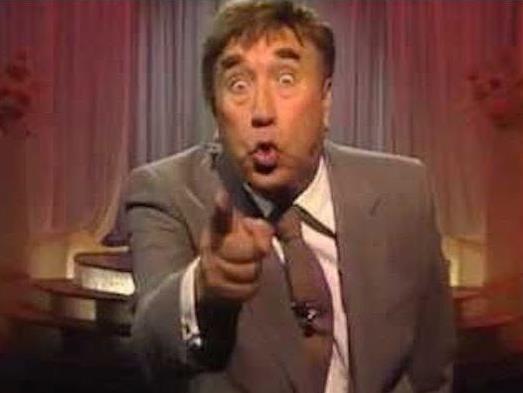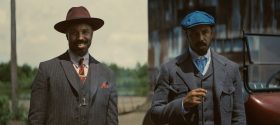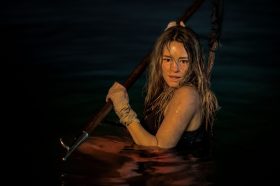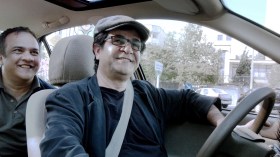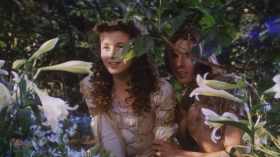Hugh Stuckey worked with Frankie Howerd several times, both here and in the UK. He was the writer of Up the Convicts, a short-lived Channel Seven series made in 1976.
At 83, the much loved screenwriter Hugh Stuckey has been in the biz for seventy years. He started a professional comedian on radio at the age of 13. He was the first comedy writer on Australian television, the first Australian writer working in Hollywood, and one of the founding members of the Australian Writers’ Guild.
His showbusiness career started when his father took him to learn tapdancing when he was just four. He doesn’t remember winning anything. When he got to 11 or 12, there was a UK comedian called Arthur Askey who recorded a song called Kiss Me Goodnight Sargeant Major, which he sang “as a slightly drunk soldier. It was wartime.”
Hugh tried his own version, and his mother thought it was funny. She told the dancing teacher about it, and a routine was soon developed for him. All of a sudden, he was winning competitions everywhere he went. “All I had to do was go on,” he said. “No-one else was doing comedy.”
When he got a little older, he started working during the day as a shipping clerk with Australian Paper Manufacturers, but at night he’d perform with about 20 others at parties, military bases and hospitals all around Victoria. He finished at five, and caught the bus from the gas company building to wherever he needed to go.
His parents weren’t theatrically inclined, but as his father had lost a lot during the Great Depression and never fully recovered, his philosophy for Hugh was that he should “get a good secure job and be an entertainer at night and on weekends.”
Don Baker from local radio station 3DB put on a show for kids on a Saturday afternoon called Kiddies Capers. The performers all had to be aged under 16. Hugh was on the show every Saturday afternoon for two years while he was still at high school. He was paid 10s/6d. It was also the first time he’d seen a script.
John Ewart, the presenter of the show, taught him how to mark a script during rehearsals, underlining cues, etc. Having seen scripts and “having a thing for comedy,” he got the bug. He commented that the only things he was good at at school were “lunch, sport and essays.” He says that he wasn’t academic at all, “but I just loved writing.”
He bought a secondhand typewriter, learning to type with two fingers, and wrote his first sketch. He sent it in to the ABC and got a call from a producer who said that they were putting together a Saturday night radio variety show. He said, “I’m doing a segment for new talent, and I’d like to use your comedy script in it and introduce you as new talent.” Hugh laughed, “Big excitement that was, I can tell you!”
The segment was similar to New Faces, and the head of the panel was Dame Myra Roper. Hugh’s never forgotten her name because she said, “we found the skit amusing but we see no future whatever for this writer.”
One of the musicians in the orchestra however also worked for 3DB. He told the producer at 3DB about Hugh. That man was Norman Spencer who later became the godfather of Australian television, inventing and making In Melbourne Tonight. Norm gave him some writing work for radio (it was still pre-TV days).
He was still working a day job while writing at night and on the weekends. “I don’t know where the discipline came from,” he said. “I used to come home before we were married and have dinner with my family, then ride my bicycle over to her place and we’d sit around for half an hour. I’d keep thinking, I’ve got to go. I’d get back home and write until midnight four nights a week. Some of it was speculative but most of it was for 3DB. I ended up making more money in my spare time than I was for the full time job. But Dad’s words, ‘a good, secure job…The next depression isn’t far away you know.’”
3AW then picked him up and he wrote a sitcom for them called Monty’s Cabaret which was 13 half hours, which were successful in Melbourne terms. This was followed by a further 13 episodes.
The Macquarie Network, then based out of Sydney, offered him work if he went to Sydney. They wanted him to take over one of their main shows. He was only 25 at the time, and wonders whether he would have ever given an inexperienced 25 year old the same opportunity. Nonetheless, he worked there for six years and the show was always in the Top Ten in the ratings.
The people who owned Macquarie were also part of the company that owned Channel Seven television. One day, his manager came in and asked if he’d like to have a look at the television exhibition down the road. It was just Hugh and a producer, and they signed both of them to the network. That was how he became “certainly the first comedy writer” in Australian television.
Hugh raced around Sydney trying to find a book on how to write for television. He didn’t have any idea, and he also didn’t have a television at home. Hugh and his wife Shirley used to take folding chairs to the furniture shop and watch the television through the window to see how it was done.
He was taken out to the studios in Epping, where he met the producer and director of the show. He found the control room to be amazing, with screens and buttons everywhere. There were three cameras, and they explained what they do. On the floor, he was shown the sets so he’d know the parameters.
The show was only on two nights each week, but Hugh had to write two or three sketches for each night. While, “in retrospect it was fun, in real time it was stressful.” He believes that you learn far more on the job though than through books or courses.
He eventually bought a television set.
Norm Spencer had by then become the production manager at Channel Nine and In Melbourne Tonight had started. Norm suggested he become the head writer on the show, along with a team. It was five nights each week, with three comedy spots each night.
By this time, Hugh had a daughter, and Shirley was seven months pregnant with their second child. They had to uproot from Sydney as quickly as they could and return to Melbourne.
The “team” of writers on the show turned out to be “a man called Jack Brown.” Jack and Hugh got along well though. He’d written little comedy, but was a good entertainer. Hugh stayed in the role for three and a half years. They had to give host Graham Kennedy ten topical jokes (of which he’d use around four) late in the afternoon after the papers came in and everything else had been written. The degree of difficulty was much harder without the internet. They also had to write a two-hander of up to five minutes for Graham and comic Joff Ellen. There was also a sketch of between five and eight minutes with a couple of other characters in it, including Rosie Sturgess. The hardest part of course was always the punchline.
He started work at 9.30am and had a break at 2.30pm for a rehearsal before going back and writing more. At about 7.30pm, they had a camera rehearsal and once it was done, they could go home. Most of his evening meals were spent in front of the television watching the show. Friends would often pop in, and he only found out later that they came to watch him gesticulating about the show. After three and a half years, he was completely exhausted but had learnt how to write for television.
He’d also stumbled into a Ford trade show by this time. They wanted to introduce the first Falcon to Australia and decided to do it on Channel Nine. Jack and Hugh got the job of writing it. It was a huge success, and as a result the ad agency representing Ford contacted Hugh (as Jack had become quite ill at this stage) to do all of their trade shows for the next 12 years. They never seemed particularly concerned about the budget either – “whatever we wanted to do, we did.”
Channel Seven then developed the Delo and Daly show in 1962. The hosts were two Americans who came out for IMT. They were funny and very clean, unlike those grubby rock and rollers.
The Honeymooners was originally a sketch within Jackie Gleeson’s show, but he and Art Carney decided to spin it off and make it into its own sitcom. Hugh felt inspired by this and knew they had some good people. He wanted to learn how to do it, so he contacted the new Australian Writers’ Guild (of which he was a founding member) then wrote to the Guild in America asking whether they could assist him in finding a producer who’d be willing to teach him how to make a sitcom. He didn’t hear anything for almost a year and was deeply disappointed.
Then one day a letter came from WGA East saying that they’ve been trying to find a sponsor for him. While they hadn’t been able to manage it, they had found a producer who would get in touch with him and would help. The following day he received a letter from Sheldon Leonard. He and Danny Thomas were T&L Productions. They were making The Dick Van Dyke Show, The Andy Griffith Show and The Danny Thomas Show, amongst others. They said that they’d make their people and facilities available to Hugh for as long as he needed in order to learn how to do sitcoms. All he had to do was get there.
“Now that was education,” Hugh said. The only show he didn’t work on was The Joey Bishop Show. Joey was a part of the Rat Pack. While they said Hugh was welcome to go, he has always found the best source of information to be the crew, and the crew weren’t fans. They referred to the show as “the cemetery – you’ll only go there when you’re sent.”
The other shows were “mindboggling.” Hugh was living in a suite about 100 yards down the road and used to go there at 9am. On The Dick Van Dyke Show, they had a read through at a table a week before the taping and suggestions were made. “They were all positive,” he said.
One another show, he worried that he was out of his depth because he didn’t find the script to be funny. At the end of the reading, they asked for suggestions, saying “with your help, we can turn this into really good production.” In all the time he was there, he never heard a negative word. Instead, they were all trying to think of ways to make things better.
“It’s the only way to run a writing room,” Hugh said. “Very few people can come up with a gem off the top of their head, but somebody will say something and that’ll prompt somebody else to do a little bit. It’s like the contest between actors and directors who want to do improvisation and writers who want to write. My answer to them is, well, improvisation is exactly what writers do. Get an idea, improvise, and then develop and polish it. The difference between writers doing that and actors doing that is that writers cut out all the crap.”
Carl Reiner, father of Rob Reiner, was a huge success when Hugh was there. He had the number one box office film, The Dick Van Dyke Show was on top, he and Mel Brooks had a club routine they did called The 2000 Year Old Man and they did some recordings which were the top comedy records, and his biography Enter Laughing was number one on the non-fiction book list. “And there he was every day.”
Carl had written The Dick Van Dyke show by himself for three years, but the producers said “you’ve got to take on other writers. And then they got stuck with me sitting in with them while they threw ideas around.” Every day at 5pm, the writers would go into the studio. The six foot six Reiner was “surrounded by an aura. The director would stop the rehearsal which had been going on since nine in the morning…Reiner would sit on a big high stool…The actors would go through the rehearsal from the beginning.” Reiner would then provide notes and with jokes added where needed. Within this, “everyone could make a suggestion.” This happened four days a week and a final script was developed. There were no further suggestions after the fourth night. The following day there was a camera rehearsal and the recording.
Hugh was in the US for a couple of months the first time, but had to come back because he was still doing the Delo and Daly show. He was keen to see Norm Spencer and start a sitcom, but instead he was given a daytime show to produce, a role he had never taken on before. Time for Terry was a one hour show, five days a week. Three episodes each week were live to air and two were recorded. When the show became successful, there was also an additional 90 minute show added to the mix.
He also worked on UK comedian Tony Hancock’s Australian show. Tony was an alcoholic but while it was stressful, they got along well. Hugh effectively became his keeper for the last two years of his life, and Tony spent a lot of time with Hugh’s family. He recorded three shows before killing himself in Sydney in 1968. He commented once to Hugh that if he’d had children, as Hugh had done, his life may have turned out very differently.
Very upset by the death, Hugh and his wife decided to return to America. On this trip, he wrote storylines for Bewitched, The Flying Nun and I Dream of Jeannie.
By this time, his kids were at school. It was the time when drugs were everywhere (it was 1969). His eldest daughter told him that 70% of her teachers were on drugs. The police contacted them one day to see if their daughter might be able to assist them to catch a man suspected of giving his own daughter marijuana-laced cookies to hand out at school. There was also a shooting nearby, and other scary incidents. Hugh had been offered Liberace’s show, but they instead decided that they didn’t really want to bring their kids up in the US and returned to Australia.
Hugh commented that “I’ve got no regrets. I did what I did at the time under the circumstances and lived with it. It would have been great to have worked on the show, but for the price of my kids? No way!”
Somewhere along the way, he got a call from Grundy’s. They were doing a new show and they were commissioning three writers to write one week each. They had to draw numbers out of a hat to work out who got which week. Hugh got week three. The show was Neighbours. “I was so successful,” he joked, “that the next week I did was week number two hundred and thirty something.” In total, he’s written around 70 episodes of the show along the way. Twice, he became the story editor on the show as well.
At around this time, Ten in Melbourne bought out an English comic called Frankie Howard who had been in many of the Carry On films. Ted Dunn produced two specials with him, but Frankie didn’t know that until he arrived and had only bought enough material for one. Ted asked Hugh if he could write something for Frankie. Frankie liked it and took him to lunch one day. He said that he always has trouble finding writers who can write in his style, and asked if Hugh might write a pilot of Up Casanova.
This was still the time of typewriters and long distance phone calls and sending a letter via airmail took three and a half or four days. He sent off the script and didn’t hear anything back. Sadly, this was around the time that Crawfords was effectively shut down and 700 people lost their jobs. It was a bad time. “I couldn’t even get arrested,” Hugh said. He kept working on spec scripts, and then he found Up Casanova. He wrote to Frankie and Frankie called back apologetically, saying that the BBC wanted to do it.
Frankie also said he’d try to help out with Hugh’s situation. Hugh’s eldest daughter was by that stage doing year 12, so he decided that it would be best if he went by himself. Actress Miriam Carlin had told him to call when he arrived in the UK, and she advised him that Billy Cotton Jr at the BBC was expecting his call. Keep in mind that during the 1970’s, English comedy was at the top of the tree, and this was the Head of Comedy.
Billy’s secretary said that they’d been expecting his call as well. They met and Hugh was offered a job immediately, under contract. He was on a retainer which was substantial for the time – he could live in a nice place, see shows and eat well. Through the light entertainment script unit, he got to work on shows like The Two Ronnies, Dave Allen and Dick Emery.
When he’d been there less than a year, the next man down from Bill Cotton called him in. His secretary said he’d like to “take tea” with Hugh. The tea and cucumber sandwiches arrived, served by a maid, and he said that in England, unlike Australia, they like their writers to be fresh. He suggested that Hugh take a break in the Cottswalds. Various suggestions were made about what he should do. He also still received his retainer, and the retransmission payments to writers were also higher in England than in Australia.
Sadly, around this time, his marriage fell apart. His wife moved to England for about a year, but she never really liked whereas Hugh loved it. They moved back to Australia, but their marriage fell apart regardless. With the news that he would have to move to Sydney to work on A Country Practice, they decided that the time was right for them to break up.
A Country Practice “was a beaut show!… It was as near to perfect as you could hope to get. It was a big team effort.” They did two hours a week. Hugh described how “It was a fabulous team of writers. We had a big round table. There was the script producer, a couple of editors, a couple of researchers – the researchers were the key to how good that show was – and the two writers who were each going to write a one hour script. We had two days a week, one to prepare one show and the next day to prepare the other show. That was so stimulating. It was wonderful. Huge success. I did that for eight and a half years.”
Jim Davern, who created the show, created a “really really good concept.” He entered it in a scriptwriting competition run by Channel Ten. There were over 80 entries, and A Country Practice came third. Hugh explained that he was asked by an executive at Ten and asked if he would read the script which the committee at Ten wanted to award first prize. Hugh read it and said that it was impossible to produce, but it still won. Neither the first nor second place winners were ever produced, and Jim Davern offered Ten the program but they said no. He instead took it to Seven where it ran for ten years. Eventually Ten bought it.
After A Country Practice, Grundy’s asked him if he’d like to be a script editor for a while, and he worked on a few more trade shows.
He also worked on an SBS series called The Maestro’s Company. As an opera appreciator, he loved it. It was a puppet show with two live children in it which introduced kids to opera. There were 13 half hour episodes. He was working with director Bill Fitzwater, “a genius” who had worked in the performing arts department of the BBC for 20 years. Hugh had been introduced to opera by a friend of his fathers’ who was an opera buff. From the age of about 12, Hugh would travel down from McKinnon to St Kilda one Sunday a month and would be told the story of each opera, and “it was such a treat.” Hugh thought that through working on the show, he “might be doing the same for some other kid.”
He was around 40 at the time, and found that “television didn’t want to know me once I got old,” so he had to create things for himself. He wrote a one-woman play which a producer was keen on, but “the poor bloke got cancer.” He heard from him yesterday however, saying that he’s recovering and wants to meet again soon.
He was also commissioned by a composer/producer who wanted him to write an opera. Not far in, Hugh realised “this ain’t no opera. I could maybe make an operetta out of it. Now it’s a musical.” This week, he heard the score from beginning to end for the first time. “Talk about exciting! Wonderful feeling!” he said.
Asked what he’s learnt about the industry, he replied that there are many people who say “’I’m going to write a book one day, as soon as I’ve got time.’ The difference between saying you want to write something and actually doing it is when you really really want to do it, you sit down and do it. You make the time. Writing is about writing. You’ve got to write.”
When he was teaching screenwriting at RMIT and other places, he’d say to the students, “just get out there and write. Just write something. I can tell you all the tricks of the trade and all the things you should know about the structure, but until you actually write something, you’re not a writer…You’re the only one who thinks it’s any good until you sell it or get an interest in it from somebody who knows, so don’t rely on your Mum! She’ll always say, ‘it’s lovely dear.’ It can be very satisfying when you’re successful. It can be awfully frustrating when you’re not. Look at my first criticism. You can certainly make money out of it, but it requires full on dedication. There’s images of writers knocking down litres of wine, but I developed an attitude, if I’d been a grocer or had a supermarket, money I made I’d have to put back a lot of it into the product on the shelves, and so I regarded my brain as the grocer’s shelf.”
At one stage when he came back from England, there was a Guild function he attended and met up with many old colleagues. Asking what they did, they’d say things to the effect of “I’m just doing Neighbours. Hugh was appalled by this, “what other show is there? At that stage it had been running for years, five nights a week and it was being sold in about 27 countries. I said ‘Come on, it’s the best soap machine in the world. We do them better than anybody else. We really do.’” As a result, he decided to get back on the committee because “we’ve got to stop putting ourselves down.”
He found that one of the greatest pleasures in the UK was the Radio Times which was the tv guide. It would list the program and start with the names of the writers, with directors and others following.
He admitted that his blood boils when he hears film critics saying things like “‘the director created this great moment.’ The WRITER created it. The directors, while certainly creative, are interpreters. I get so angry.” He wishes that the Guild would fight harder for it.
He remembered hearing one critic on the ABC who said that writers “just write the dialogue and all the rest of it is up to the director.” It’s very different to the playwriting world in which the writer’s name is above the name of the play, and it brings audiences in.
He pointed out that there’s a tradition in showbusiness which started in radio, “where people like the sponsors were allowed to make contributions to shows and they were never ever positive. They were all negative – don’t do that, cut that out… In Hollywood, they’re good executives but they’re not creative and they don’t often understand. You see films ruined by the last few minutes where the accountants say ‘we’ve got to have a happy ending.’” He gave The Shawshank Redemption as a prime example.
“Back in the really good days in Hollywood, the writers were pretty much the gods” but now it’s all about reboots and remakes. Hugh believes that people are far better off just doing their own thing and making up original stories, even though there are very few writers who can say ‘I’m a film writer.’ There’s plenty of money in television though, and ways to make a living.
Hugh is currently writing his autobiography.
